Reviews
Paul Donovan
Canada, 1984
Credits
Review by Thomas Scalzo
Posted on 18 August 2013
Source New World Video VHS
Categories Favorites: The Apocalypse
It is the day after tomorrow. The ultimate nuclear defense system has been perfected. Security has been achieved. Global conflict is now unthinkable.
Unthinkable, of course, so long as pirates don’t hijack a shipment of Tomahawk missiles and accidentally fire one into the Soviet Union. In that case global conflict is inevitable. And in the world of _Def-Con 4_1, global conflict means an untold number of nuclear warheads exploded above all the major population centers on earth. The majority of the people are killed, others are blinded, and still others are left to suffer the lingering affects of radiation poisoning. As their bodies and minds slowly deteriorate, these unfortunate souls become little more than feral animals, skittering through the trees killing and consuming anything they find. Though there are a select few who have managed to escape the carnage unscathed, the age of civilized humanity has come to an end.
Witnesses to this devastation are three astronauts, tasked with manning a missile defense satellite. With communication with headquarters cut off, Walker, Jordan, and Howe can only watch in horror as their computer monitors flash with detected warhead detonations. Once the chaos of the war has ended, and the true horror of their situation sinks in, the team decides to try a return to earth: but where to go? Based on the data they have, Antarctica, the Seychelles, Easter Island, and some isolated spots in South America would give them the best chance to both locate survivors, and not be destroyed by radiation. Just as they are about to formulate a plan, however, their satellite control systems are mysteriously taken over by an external source, and they are compelled to make an emergency crash landing, somewhere on the east coast of North America.
From the film’s opening credits up until the time the crew crash lands on the unnamed beach, Def-Con 4 does everything right. We have a unique apocalypse setup, three potentially interesting characters, and a newly post-apocalyptic earth that could be the basis for literally any type of engaging story. In fact, for the first few minutes after the crash landing, writer/director Paul Donovan is able to keep this magic going, staging a great scene in which Howe and Walker frantically dig through the sand covering their escape hatch and try to reach whoever it is knocking on the satellite hull. When Walker finally breaks through, he is mercilessly torn out of the satellite, his piercing screams compelling Howe to frantically replace the hatch door. With Jordan unconscious, it’s up to Howe to somehow escape from the satellite, evade whatever it was that devoured Walker, and figure out how to survive in this horrible new world.
Unfortunately, once Howe gets free of the satellite, and meets up with a loner named Vinny and his lady friend J.J., Donovan’s screenplay grinds to a halt. Before we get a chance to get to know this trio, and identify with their peril, they are captured by the forces of Gideon, the local despot, and brought to the festering cesspool that is Fort Liswell. Food is scarce, sanitation is a thing of the past, and cruelty is the order of the day. Gideon rules with an iron fist, doling out punishment and death with impunity. Subsequently, our heroes are tossed into feces-filled subterranean cells, and are forced to sit and wait, until such time as their punishment can be decided. Soon after the doors to these cells slam closed, Donovan’s creative juices run dry, and any semblance of narrative momentum dissipates.
Though the idea of an unsavory post-apocalyptic town ruled over by a tyrant is somewhat of a genre cliché, the set up could have been made to work, had Donovan merely used it as an impetus for developing colorful characters or a jumping off point for future adventures. Sadly, the aspiring auteur seems enamored of his fetid town, choosing to spend nearly every remaining minute of screen time eschewing robust characterization in order to wallow in the sordid details of this decrepit dwelling place, the mud, urine, spit, and general filth taking on the importance of a central figure. Even when a potentially interesting person is introduced, in the form of a scientist named Boomer, Donovan quickly establishes that the man is hopelessly paralyzed, and sees to it that within moments of appearing on screen, he is face down in the mud.
Initially, we hold out hope that Howe will feed off this new adversity, and become a man worth rooting for. It soon becomes clear, however, that in terms of post-apocalyptic heroes, Howe is no Snake Plissken. He screams, he runs away, and he shows a disheartening lack of nerve in tense situations. As for Gideon, a potentially colorful villain in the Duke of New York mold, we’re offered but one tantalizing hint that his character has some depth. Confiding to J.J., he utters, “You think I’m ruthless because I want to be. It’s the only way to administer resources in an unstable situation.” Sadly, these words from a seemingly conflicted man are all the evidence we have that Gideon is more than the heartless thug seems. Thus, with no one to root for, and nowhere to go, we’re left to endure in this dark, unpleasant world.
As the final credits begin to roll, we’re told, “The final victory has been won. Mankind can now rest in peace.” Just what Donovan is getting at here is anyone’s guess. Is the final victory the complete destruction of humanity? Is mankind able to rest in peace because no one is left alive? The somewhat hopeful closing shot of Howe and company sailing into the sunset would seem to belie this notion. Is it possible that Gideon was meant to personify all that is evil in the world, and that by besting him Howe somehow eradicated all darkness from the earth? It’s impossible to say. Perhaps Paul Donovan had a greater message that was lost during the course of this film’s creation. And though something certainly went terribly awry between his engaging first act and this ambiguous ending, we must at the very least give the man credit for attempting to use his chosen medium to teach the world some sort of lesson, as obtuse as that lesson may be.
- The film has all the hallmarks of a project put together based on an intriguing idea, but without a lot of thought. To wit, the very title of the picture: Def-Con 4 is short for Defense Condition 4, Defense Condition being a numerical gauge from one to five measuring how close the United States is to nuclear war. As anyone who has seen War Games knows, the highest, most worrisome level is def-con 1. Def-con 5 means status quo. So, were the nation to be brought to def-con 4, it would simply mean a state of heightened awareness. It’s possible that, in terms of this film, the war machine started moving so fast that the folks at NORAD didn’t have time to elevate the ranking all the way to def-con 1. It is more likely, however, that Donovan simply didn’t understand what the numbers meant. ↩
More Favorites: The Apocalypse
-
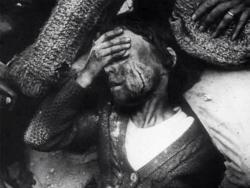
The War Game
1965 -

On The Beach
1959 -
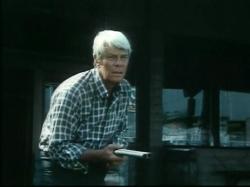
Where Have All the People Gone
1974 -

A Boy and His Dog
1975 -
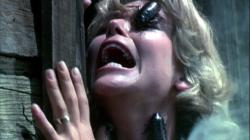
Bug
1975 -
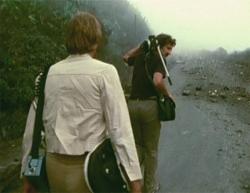
La Soufrière
1977 -

Escape from New York
1981 -
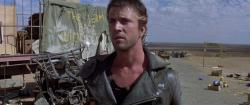
The Road Warrior
1981 -

Le Dernier Combat
1983 -

Night of the Comet
1984 -

Threads
1984 -

The Terminator
1984 -

Def-Con 4
1984 -
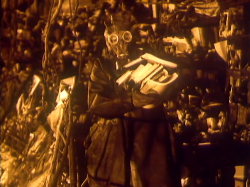
Letters From a Dead Man
1986 -
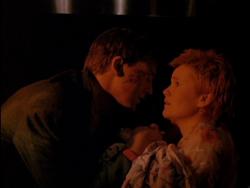
Miracle Mile
1988 -

Last Night
1988 -

Last Days
2005 -

The Rapture
1991 -

Southland Tales
2006 -
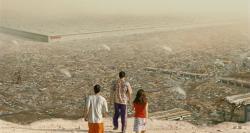
Idiocracy
2006 -

The Happening
2008 -

The Road
2009 -

Cosmopolis
2012
We don’t do comments anymore, but you may contact us here or find us on Twitter or Facebook.



